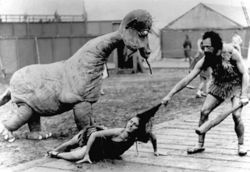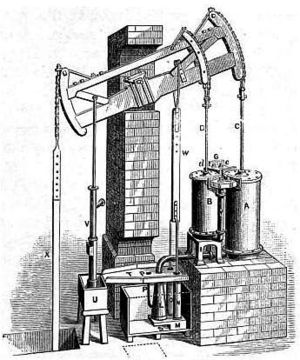The Past
This page contains out-of-date information or is out of date in general. Please proceed to |

"2020" redirects here. For the year, see Hell.
“Nostalgia is not what it used to be...”
It is often said that The Past is a foreign country. This is because the people there are strange and often frightening, and you can't trust the food. Most things that have happened so far have happened in the past, except for stuff like Star Trek, Planet of the Apes and the invasion of Mars by George Dubbya Bush, which all happened in The Future. It is easy to distinguish the Past from the Future. In the future everything is covered with flashing lights and either flys or hovers, and a detailed description of The Past is readily available from Old People, often without any provocation whatsoever. The past has been around for quite some time now - having checked a calendar it's been there since at least last December, and some Scientists speculate that it may have been around for several years or more prior to this point.
| Human history and prehistory |
|---|
| ↑ before Homo |
| Prehistory |
|
| History |
|
|
| ↓ Future |
Important Periods In The Past[edit | edit source]
A Very, Very, Very, Very, Very Long Time Ago[edit | edit source]
This bit was really cool and had lots of large-chested women in fur bikinis and dinosaurs and stuff. The really great thing was that language had not been invented by this point, so the large-chested bikini women couldn't terrorise men by making demands to go shopping, or by talking all the way through Top Gear and Football. Also volcanoes were pretty big around this time, as was the occasional giant crab. Steven Spielberg was born in this period, later going on to dramatise his early childhood memoirs in the film Jurassic Park.
A Very, Very, Very, Very Long Time Ago[edit | edit source]
This period was dominated by two powerful factions;
- The Romans - who invented being drunk.
- The Greeks - who rather less impressively invented triangles, but made up for it by also inventing the Doner Kebab to capitalise on drunk Romans.
Much of their time was taken up with a mighty feud over which of them invented the Toga, a sort of giant nappy (or diaper, for illiterates) in vogue with most fashionable deviants of the time. Both of them had a whole pantheon of utterly loopy but almost identical Gods who got up to all kinds of deranged antics. Zeus, for example, liked nothing better than to appear on earth in the form of a swan in order to seduce young women, because it is well know that young Greeks and Romans liked nothing better than shagging swans. Obviously.
Another notable faction from this era was The Spartans, who famously dined in Hell, the restaurant served by celebrity chef Gordon Ramsay during his reality TV show "Hell's Kitchen".
A Very Long Time Ago[edit | edit source]
This was a time of exciting change for the world, beginning around 1765 when renowned engineer James Watt invented the Nuclear Fission reactor. Quickly realizing that Fission reactors could almost entirely replace Cloth Caps as the primary means of heating in Northern England, Mr Watt set about procuring the colossal funding and investments he would need to also discover Uranium, a vital component of his new invention. Equipped with several suitcases full of cash from his backers, Watt spend several years mining for this as-yet undiscovered element, digging up large portions of the North-East of England in the process.
Unfortunately, by the end of this arduous period of prospecting, all Watt had to show for his efforts was several million tonnes of an entirely useless, soft black rock. Faced with increasing anger from his investors eager to recoup their money, Watt first made an abortive attempt to open these mountains of loose rock as a cheap ski resort for the working classes, before one night attempting to burn the evidence in a fit of desperation and insanity.
By a happy coincidence, this useless soft black rock proved to be remarkably combustible. Wasting no time at all Watt immediately re-branded it as ‘Coal’, going on to make several much larger suitcases full of cash as it soon replaced unwashed peasants as the nation's primary source of energy. And so the Industrial Revolution was born.
A Long Time Ago In A Galaxy Far, Far Away[edit | edit source]
This is when and where all eight 30-minute episodes of Star Wars took place.
The Truth About The Past[edit | edit source]
Truth is that the past doesn't actually exist and because you don't have a past you have no experience and you can not learn from others experience because no one knows what just happened because nothing just happened and when you think about it you can not understand because you are not reading it now and therefore it didn't happen...essentially if you do have a past you are going to create a black hole by trying to explain it to someone who has no past...it is all very confusing and you should probably just give up on life.
The past is like the future but in the past.
Time - Calendar - Second - Minute - Hour - Tomorrow - Today - Yesterday - Day - Weekday - Weekend - Month - Year - Decade - The Past - The Present - The Future
Months of the Year: January - February - March - April - May - June - July - August - September - October - November - December
Days of the Week: Monday - Tuesday - Wednesday - Thursday - Friday - Saturday - Sunday

